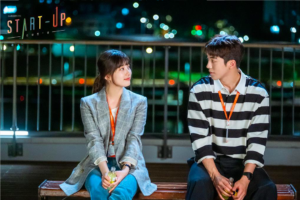
The business that goes on in Korean dramas is oftentimes shady and tied to chaebol companies. Start-Up, however, like the title signals, dives into the world of startups. Starring Suzy and Nam Joo-hyuk, the drama came to an end last weekend. Despite its promising start, Start-Up ultimately fails to keep the momentum until the end.
The drama focuses on Seo Dal-mi (Suzy) and Nam Do-san (Nam Joo-hyuk), who work together at a startup to achieve their various dreams, one of which is making each other happy. The two are initially entangled because Dal-mi thinks Do-san is her childhood pen-pal, though it is actually Han Ji-pyeong (Kim Seon-ho). Ji-pyeong completes the love triangle but also serves as a mentor to both Dal-mi and Do-san, which obviously complicates matters. Cue Won In-jae (Kang Han-na), Dal-mi’s estranged and successful older sister, and the drama is underway as Dal-mi and Do-san face trials and tribulations with business and romance.
This review contains spoilers.

Start-Up takes its theme very seriously: most of the episode titles are business terms such as “Burn Rate”, “Acqhire”, and “Key Man”. The titles are accompanied by a short explanation of the term, and are indicative of what goes down in each episode. For example, in the episode titled “Acqhire”, Samsan Tech is “acqhired”, bought primarily for the expertise of its staff, by another business. Though there are dramas centered on jargon-heavy workplaces like hospitals or courtrooms, a drama dedicated to the world of startups is fresh, and the commitment to its context is welcome.
Start-Up starts strong as it establishes that beyond the romance, the drama is also about the significance of dreams and what we need to achieve them. Meeting goals takes time and Start-Up points out that everybody needs a period of growth and learning before they can flourish. The road to success is not a lonely one and the drama also showcases the different kinds of support that people need.
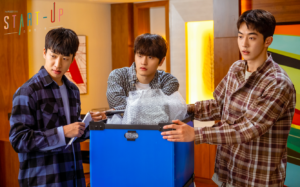
The beginning of the drama is set in the spring when cherry blossoms are in full bloom. However, our four protagonists, Dal-mi, Do-san, In-jae, and Ji-pyeong, are certainly not blooming. Dal-mi loses her job, Do-san is a CEO of the struggling startup Samsan Tech, In-jae realizes her chaebol connections overshadow her actual work ethic, and Ji-pyeong’s letters he wrote to Dal-mi come back to haunt him. Aside from their personal situations, each of them is struggling with insecurities that nibble away at their self-confidence.
Dal-mi’s grandmother, Choi Won-deuk (Kim Hae-sook) tells Dal-mi that she is a cosmos that will bloom in the fall, long after the other flowers have bloomed and wilted away. Indeed, for Dal-mi and for the rest of the characters, the spring is not a season full of beauty. Instead, it is a time of birth and growth. Dal-mi, Do-san, and In-jae all enter Sandbox where Ji-pyeong is working, and they learn to maneuver the world of startups as well as the romantic feelings beginning to develop.
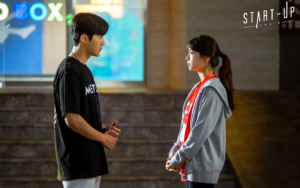
Fittingly, Start-Up comes to a close in the fall, when the aforementioned cosmos as well as Dal-mi, Do-san, Ji-pyeong, and In-jae have reached full bloom. After a time jump of three years and a separation then eventual reunification Dal-mi and her team are at their best. They are working under In-jae who has succeeded on her own two feet. While spring has passed and other flowers are long past their prime, the time the characters spent learning and maturing has paid off and now it is their own time to shine. Dal-mi and Do-san’s new self-driving car is a success because of their increased skills and experience; however, it is their confidence in themselves and each other that truly showcases how much they have grown. Start-Up points out that there is no need to beat ourselves up because it seems like we are behind, as our own time in the spotlight will come.
Start-Up also shows how everyone needs a helping hand on the journey to success. This mantra is the idea behind Sandbox, the business incubator where much of the drama takes place. It helps startup companies, such as Dal-mi and Do-san’s Samsan Tech, try out new things and fail without harsh consequences. Much like landing in soft sand after falling where you can get up unhurt and willing to try again, hence the name Sandbox.
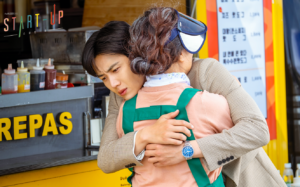
This message bleeds into other facets of the drama, as it is not just ambitious startups that need a place or a person to fall back on. Ji-pyeong and Won-deuk’s relationship showcases this exact unconditional support. As a teenager, Won-deuk helps Ji-pyeong, whom she nicknames “Good Boy”, and even as an adult Won-deuk is someone that Ji-pyeong seeks for consolation and support. Ji-pyeong is probably the last person in the drama that requires financial assistance, but no matter who we are and what we are doing everyone needs someone who can offer affirmation and encouragement.
Though Start-Up starts strong with a meaningful theme to boot, the consistent melodramatic tone is ditched as Start-Up rushes towards a happy ending. Significant relationships between the characters are not given the development they deserve and plot twists are overlooked and resolved in a careless manner.
The first example is the relationship between the four women in Dal-mi’s house. By the end, Won-deuk, Dal-mi, and Dal-mi’s mom Cha Ah-hyun (Song Seon-mi) are all living together, and even In-jae is welcomed back by her family members with open arms. However, though Won-deuk and Dal-mi spent a significant time apart from Ah-yeon and In-jae, the drama glosses over the ugly feelings and highlights only the joyful moments they can share as a family again. A deeper dive into the complexity of the emotions that these four women have in relation to each other would have provided more dimension to each of them.
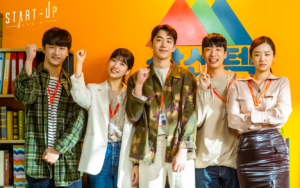
The relationship between Kim Yong-san (Kim Do-wan) and Ji-pyeong was another that was very messy and almost unnecessary. Yong-san’s true intentions of avenging his brother’s death, which he believes Ji-pyeong is responsible for, were foreshadowed early on. However, there is no substantial follow-up of this plot twist other than a quick confrontation and make-up conversation. It could have served a much better purpose in giving Ji-pyeong an unlikeable edge to counter his “Good Boy” image. Unfortunately, the twist was not given enough development and the drama could have done without it.
On a lighter note, the Jeong Sa-ha (Stephanie Lee) – Lee Chul-san (Yoo Su-bin) couple deserved more screen time. The chic city girl and the nerdy country boy who is head-over-heels in love with her are endearing comedic relief against the more melodramatic Dal-mi and Do-san couple. The build-up to their relationship was very sweet and often hilarious, but their happy ending did not live up to its full potential. Yes, they finally get together, but how do the others react? Do they have romantic café dates where they drink their beloved iced vanilla latte?
Start-Up, unlike its characters, starts out strong and fizzles out towards the end of its run. Despite its inspiring message, it glosses over plot points that deserve more development as it ends with a happy but rushed conclusion. Despite its flaws, Start-Up does deserve a mention if only for its unique setting in the world of startups.
(images via tvN)


